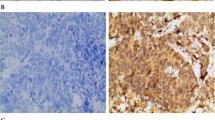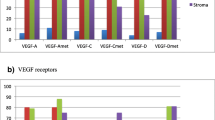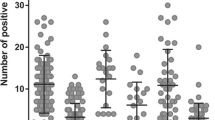Abstract
Vascular endothelial growth factor (VEGF-A) is considered a prognostic indicator for clinical outcome in breast cancer. Conflicting results nevertheless exist and there is a need for larger studies including untreated patients in order to clarify the importance of tumor-specific VEGF-A regarding prognosis as well as potential links to predictive treatment information. VEGF-A and its receptor, vascular endothelial growth receptor 2 (VEGFR2), were therefore analyzed by immunohistochemistry in postmenopausal breast cancers enrolled in a clinical trial where patients were randomized to adjuvant tamoxifen treatment (n=124) for 2 years or no treatment (n=127) with a median follow-up of 18 years. The tumors were arranged in a tumor tissue microarray system enabling parallell analysis of the angiogenic factors and hormone receptor status. Tumor-specific expression of VEGFR2 correlated strongly with expression of VEGF-A and progesterone receptor (PR) negativity, whereas VEGF-A was not associated with hormone receptor status. Among patients with estrogen receptor (ER) positive (fraction > 10%) tumors, there was a statistically significant tamoxifen response in VEGF-A negative tumors at both 10-year and 18-year disease-free survival (DFS), contrasting to VEGF-A positive tumors who had no beneficial effect of tamoxifen. A treatment-interaction variable indicated a marked difference in tamoxifen response depending on VEGFA-status in terms of DFS at 10 and 18 years of follow-up, p=0.046 and p=0.039, respectively. VEGFR2 status did not yield significant predicitve information for tamoxifen response in patients with ER fraction > 10%, whereas in patients with ER fraction > 90% both VEGF-A and VEGFR2 status were associated with tamoxifen treatment effect.
Similar content being viewed by others
References
InstitutionalAuthorNameEarly Breast Cancer Trialists’ Collaborative Group (1998) ArticleTitleTamoxifen for early breast cancer: an overview of the randomised trials Lancet 351 IssueID9114 1451–1467
S Ali RC Coombes (2002) ArticleTitleEndocrine-responsive breast cancer and strategies for combating resistance Nat Rev Cancer 2 IssueID2 101–112
RI Nicholson IR Hutcheson JM Knowlden HE Jones ME Harper N Jordan SE Hiscox D Barrow JM Gee (2004) ArticleTitleNonendocrine pathways and endocrine resistance: observations with antiestrogens and signal transduction inhibitors in combination. Clin Cancer Res 10(1 Pt 2) 346S–354S
R Schiff SA Massarweh J Shou L Bharwani SK Mohsin CK Osborne (2004) ArticleTitleCross-talk between estrogen receptor and growth factor pathways as a molecular target for overcoming endocrine resistance. Clin Cancer Res 10(1 Pt 2) 331S–336S
R Nahta GN Hortobagyi FJ Esteva (2003) ArticleTitleGrowth factor receptors in breast cancer: potential for therapeutic intervention Oncologist 8 IssueID1 5–17
A Argiris CX Wang SG Whalen MP DiGiovanna (2004) ArticleTitleSynergistic interactions between tamoxifen and trastuzumab (Herceptin) Clin Cancer Res 10 IssueID4 1409–1420
B Linderholm K Grankvist N Wilking M Johansson B Tavelin R Henriksson (2000) ArticleTitleCorrelation of vascular endothelial growth factor content with recurrences, survival, and first relapse site in primary node-positive breast carcinoma after adjuvant treatment J Clin Oncol 18 IssueID7 1423–1431
G Gasparini M Toi R Miceli PB Vermeulen R Dittadi E Biganzoli A Morabito M Fanelli C Gatti H Suzuki T Tominaga LY Dirix M Gion (1999) ArticleTitleClinical relevance of vascular endothelial growth factor and thymidine phosphorylase in patients with node-positive breast cancer treated with either adjuvant chemotherapy or hormone therapy Cancer J Sci Am 5 IssueID2 101–111
T Veikkola M Karkkainen L Claesson-Welsh K Alitalo (2000) ArticleTitleRegulation of angiogenesis via vascular endothelial growth factor receptors Cancer Res 60 IssueID2 203–212
A Kranz T Mattfeldt J Waltenberger (1999) ArticleTitleMolecular mediators of tumor angiogenesis: enhanced expression and activation of vascular endothelial growth factor receptor KDR in primary breast cancer Int J Cancer 84 IssueID3 293–298
L Ryden B Linderholm NH Nielsen S Emdin PE Jonsson G Landberg (2003) ArticleTitleTumor specific VEGF-A and VEGFR2/KDR protein are co-expressed in breast cancer Breast Cancer Res Treat 82 IssueID3 147–154
B Xie NN Tam SW Tsao YC Wong (1999) ArticleTitleCo-expression of vascular endothelial growth factor (VEGF) and its receptors (flk-1 and flt-1) in hormone-induced mammary cancer in the Noble rat Brit J Cancer 81 IssueID8 1335–1343
EM Berns JG Klijn MP Look N Grebenchtchikov R Vossen H Peters A Geurts-Moespot H Portengen IL Staveren Particlevan ME Meijer-van Gelder B Bakker FC Sweep JA Foekens (2003) ArticleTitleCombined vascular endothelial growth factor and TP53 status predicts poor response to tamoxifen therapy in estrogen receptor-positive advanced breast cancer Clin Cancer Res 9 IssueID4 1253–1258
JA Foekens HA Peters N Grebenchtchikov MP Look ME Meijer-van Gelder A Geurts-Moespot TH Kwast Particlevan der CG Sweep JG Klijn (2001) ArticleTitleHigh tumor levels of vascular endothelial growth factor predict poor response to systemic therapy in advanced breast cancer Cancer Res 61 IssueID14 5407–5414
D Coradini E Biganzoli C Pellizzaro S Veneroni S Oriana F Ambrogi R Erdas P Boracchi MG Daidone E Marubini (2003) ArticleTitleVascular endothelial growth factor in node-positive breast cancer patients treated with adjuvant tamoxifen Brit J Cancer 89 268–270
M Castiglione RD Gelber A Goldhirsch (1990) ArticleTitleAdjuvant systemic therapy for breast cancer in the elderly: competing causes of mortality. International Breast Cancer Study Group. J Clin Oncol 8 IssueID3 519–526
D Crivellari K Price RD Gelber M Castiglione-Gertsch CM Rudenstam J Lindtner MF Fey HJ Senn AS Coates J Collins A Goldhirsch (2003) ArticleTitleAdjuvant endocrine therapy compared with no systemic therapy for elderly women with early breast cancer: 21-year results of International Breast Cancer Study Group Trial IV J Clin Oncol 21 IssueID24 4517–4523
SM Hyder Z Nawaz C Chiappetta GM Stancel (2000) ArticleTitleIdentification of functional estrogen response elements in the gene coding for the potent angiogenic factor vascular endothelial growth factor Cancer Res 60 IssueID12 3183–3190
P Guo Q Fang HQ Tao CA Schafer BM Fenton I Ding B Hu SY Cheng (2003) ArticleTitleOverexpression of vascular endothelial growth factor by MCF-7 breast cancer cells promotes estrogen-independent tumor growth in vivo Cancer Res 63 IssueID15 4684–4691
CC Benz GK Scott JC Sarup RM Johnson D Tripathy E Coronado HM Shepard CK Osborne (1993) ArticleTitleEstrogen-dependent, tamoxifen-resistant tumorigenic growth of MCF-7 cells transfected with HER2/neu Breast Cancer Res Treat 24 IssueID2 85–95
S Garvin C Dabrosin (2003) ArticleTitleTamoxifen inhibits secretion of vascular endothelial growth factor in breast cancer in vivo Cancer Res 63 IssueID24 8742–w8748
F De Paola AM Granato E Scarpi F Monti L Medri S Bianchi D Amadori A Volpi (2002) ArticleTitleVascular endothelial growth factor and prognosis in patients with node-negative breast cancer Int J Cancer 98 IssueID2 228–233
G Callagy E Dimitriadis J Harmey D Bouchier-Hayes M Leader E Kay (2000) ArticleTitleImmunohistochemical measurement of tumor vascular endothelial growth factor in breast cancer. A more reliable predictor of tumor stage than microvessel density or serum vascular endothelial growth factor. Appl Immunohistochem Mol Morphol 8 IssueID2 104–109
V Ludovini A Sidoni L Pistola G Bellezza V De Angelis S Gori AM Mosconi G Bisagni R Cherubini AR Bian C Rodino R Sabbatini B Mazzocchi E Bucciarelli M Tonato M Colozza (2003) ArticleTitleEvaluation of the prognostic role of vascular endothelial growth factor and microvessel density in stages I and II breast cancer patients Breast Cancer Res Treat 81 IssueID2 159–168
M Toi K Inada H Suzuki T Tominaga (1995) ArticleTitleTumor angiogenesis in breast cancer: its importance as a prognostic indicator and the association with vascular endothelial growth factor expression Breast Cancer Res Treat 36 IssueID2 193–204
R Yancik MN Wesley LA Ries RJ Havlik BK Edwards JW Yates (2001) ArticleTitleEffect of age and comorbidity in postmenopausal breast cancer patients aged 55 years and older Jama 285 IssueID7 885–892 Occurrence Handle10.1001/jama.285.7.885 Occurrence Handle1:STN:280:DC%2BD3M7ltF2jug%3D%3D Occurrence Handle11180731
Author information
Authors and Affiliations
Corresponding author
Rights and permissions
About this article
Cite this article
Rydén, L., Stendahl, M., Jonsson, H. et al. Tumor-specific VEGF-A and VEGFR2 in postmenopausal breast cancer patients with long-term follow-up. Implication of a link between VEGF pathway and tamoxifen response. Breast Cancer Res Treat 89, 135–143 (2005). https://doi.org/10.1007/s10549-004-1655-7
Issue Date:
DOI: https://doi.org/10.1007/s10549-004-1655-7




